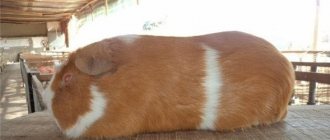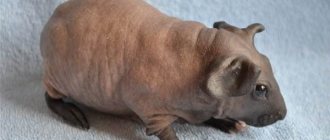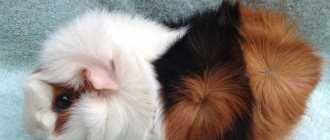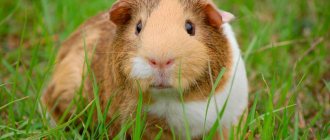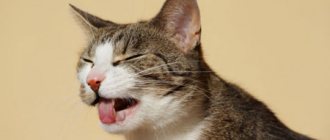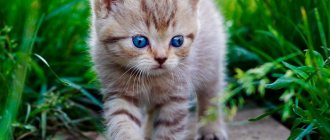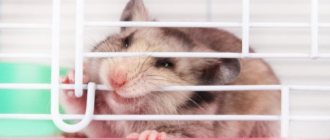What sounds does a guinea pig make?
A guinea pig can:
- grunt;
- squeak;
- hiss;
- wheeze;
- moan;
- coo;
- rumble;
- whistle;
- cluck;
- Twitter;
- growl;
- grumble;
- squeal.
Of course, all these terms are very conventional, but they are the ones that loving owners of funny rodents use to describe the strange and very diverse language of their pets. In order to understand what exactly the animal wants to tell the world with this or that sound, enthusiasts have compiled something like a dictionary or translator, which they are happy to share with everyone.
Sound of communication
The guinea pig is a pack animal. To communicate with its own kind, the rodent makes sounds that vaguely resemble concentrated grunting (hence the associative name of the species). If only one individual is kept as a pet in the house, then the animal communicates with members of the household in the same manner. Thus, grunting is a standard manifestation of communication .
Video: what sounds do guinea pigs make?
Sometimes, upon returning home after a long absence, the owner of a guinea pig hears a loud, piercing squeal coming from the room where the cage is located. Don't be afraid that something bad has happened to your animal. Most likely, the animal, sociable by nature, is simply yearning for solitude and in such a temperamental way expresses its joy at your appearance, an impatient demand to quickly communicate and play, and at the same time indignation due to your absence.
Did you know? Interestingly, the genus of domesticated rodents in question is called pigs in all European languages. So, the British call these animals guinea pig (Guinea pig), the Germans - meerschweinchen (literally translated in the same way as the Russian version), the French - cochon d'Inde (Indian pig).
Surprise or interest
“Whistled in surprise” - this phrase perfectly conveys the characteristic reaction of a person faced with something unusual. Oddly enough, guinea pigs are very similar to humans in this regard. If an animal whistles, it can mean an extreme degree of interest and even intrigue . However, whistling or snoring is also a sign of satisfaction, satiety and a complacent mood, or, on the contrary, maximum concentration on some important activity.
It all depends on the small nuances of the sound, the specific situation, as well as the animal’s behavior at the moment of the “conversation.” But, one way or another, whistling, sniffling and grunting are the sounds that can be heard: an animal makes them at those moments when, on the whole, it is satisfied with its fate and its owners.
Sounds of mating
For almost all representatives of the animal world, sexual games are one of the most important and responsible rituals. Usually they are accompanied by a “protocol” of behavior formalized to the smallest detail, strictly observed by both the male and the female. In mating games, everything matters - every movement, every sound. And precisely by how characteristic the vocal accompaniment is of the procedure of a male guinea pig flirting with his partner, we can conclude that in these animals, like in humans, women “love with their ears.”
Important! In order to understand your pet, you need to focus not only on sounds, but also on other signals that it sends through its actions.
Having watched their pets mating at least once, guinea pig owners claim that the sound heard most closely resembles the sound of drums . The male, wanting to please his partner, begins to emit a completely unique and almost continuous rattling sound, as if beating out a shot using his vocal cords.
The female, having accepted the courtship favorably, responds to her chosen one with the same “drumbeat”. As the love game progresses to its logical conclusion, communication between the couple may also be accompanied by rumbling and even growling. There is no need to worry about this: all this is also part of the ritual.
Fear and aggression
Aggression is generally not typical for guinea pigs, but often the owners of these cute animals receive quite painful wounds from their sharp and strong teeth. You should not get angry at the animal in such situations. Most likely, it tried to send a warning signal, but it was not deciphered in time.
Important! Guinea pigs bite only for defensive purposes. An animal can defend itself, its offspring, or its territory, which, as it seems to it, someone has encroached on.
That is why it is very useful for the owner of a rodent to know what sounds the animal makes at a moment of fear: fright may be followed by an attack, and after that a deep wound, pain and resentment. Growling, whining or plaintive moans are all sounds with a minus sign . If they are emitted by your pet, you should think about what caused them and immediately correct the error.
This group of signals also includes hissing, a wary rumbling (not to be confused with a satisfied one), as well as a warning clinking of teeth. These are the sounds that males usually make when trying on before an important and responsible battle for a female or territory. In the same way, a domesticated animal tries to scare or, say, warn the owner: “Don’t touch me now, I’m not in a good mood!”
Sharp whistle
In this way, the guinea pig usually communicates that it is time for lunch. A sharp and demanding whistle is produced by a very hungry animal . Having received a portion of the long-awaited food, the animal can continue to whistle for some time, but more calmly and concentratedly - so the same sound, changing timbre and volume, moves from the “minus” category to the “plus” category. In human language, this change from screaming to grumbling can be translated with a phrase like “I wish it had been like this a long time ago!”
Did you know? There are real record holders among guinea pigs. Thus, the highest long jump was made by an animal named Diesel.
—
her result was 20.5 cm, and in the 10 m race the best result was achieved by a certain Flash, running to the finish line in 8.81 seconds.
Sings and chirps like a bird
Some guinea pig owners claim that they have heard sounds from their pets that are extremely similar to birds chirping or singing. It must be said that, unlike whistling, grunting, snorting and rumbling, not all individuals arrange this kind of “concert” for their owners . Moreover, there is a suspicion that household members who adore the animal slightly exaggerate its vocal abilities.
On the other hand, many of us also love to sing in the bathroom when no one hears, but only a few have a voice that can bewitch. Perhaps among guinea pigs there are the same talents worthy of universal recognition, but forced to limit themselves to only a small audience. In any case, if an animal sings like a bird, then everything is fine with it.
Find out if guinea pigs smell.
Chirps or tweets
The pig can squeal with delight. She so vigorously expresses joy when she was picked up.
The pet must constantly be in the thick of things. If you take him to the back room and don't pay attention to him, he will get bored. When it is not possible to devote time to an animal, it is better to buy him a same-sex pair.
Walking around the room, the animal can easily make friends with other pets. Much will depend on the characters of the pets. If the kitten or puppy is sociable and friendly, they will enjoy the proximity of an affectionate pig.
An animal can squeal loudly not only from delight, but also from pain and fear. When trying to free a stuck paw or when another danger threatens.
What do moan-like sounds mean? This means that the pet is sick. In this state, he whines or groans. He will stop doing this only when he recovers.
The pig can not only squeak and purr, but also chirp and chirp like a bird. The feeling from such sounds is as if the pet is singing. Such sounds mean an extreme degree of excitement.
The pig sometimes chirps for up to half an hour, not noticing anyone around, immersed in an exciting state. This is how she experiences severe stress.
The expectant mother can thus announce to everyone around her that she will have cubs. The male can use his chirping to attract the female to mate. If two pigs are chirping among themselves, you don't have to worry. Nothing bad happens.
A squeal is a loud, heart-rending squeak, with the help of which an animal is trying to convey to you that it is experiencing fear or pain. If your pet makes such a sound, immediately go to him and check if everything is okay with him. If an animal moans or whines, then it wants to say that it is irritated or disgusted with something or someone.
Decoding the movements of a guinea pig
As was said, it is easiest to decipher the sound signals given by pets if we consider them in inextricable connection with the movements of the animals. Body language, therefore, is no less important in the communication process than vocal communication, because the same sound, depending on the circumstances, can have not just different, but even opposite meanings.
Here are just a few characteristic movements of guinea pigs with their most likely interpretation:
| Movement, behavior | Possible meaning |
| Bouncing | "I want to play" |
| Throwing back the head | "I'm stronger, I'm not afraid of anyone" |
| Dropping of the head (may be accompanied by a low purring sound) | “Let’s put up, I give up, you are stronger” |
| Standing on the hind legs with the front legs extended forward | “Admire how good I am (good)” |
| Stand on your hind legs with your head stretched up | “I really want to reach something that is extremely necessary” (usually water or treats, but possibly toys) |
| Wide open mouth showing front teeth | "Better leave before it's too late" |
| Freezing in place, complete lack of movement | “I’m not here, go where you were going” |
| Paws tucked, searching for support behind the back | “It’s scary that something might happen” |
| Head stretched forward | “I’m all (entirely) attentive” |
There is a unique term in describing the behavior of guinea pigs - popcorning. It means a complex of characteristic body movements: the animal jumps, sometimes even somersaults, shakes its head, twitches its paws, twists its butt. This behavior can seriously frighten a novice breeder, but in fact it just means a high degree of disposition, excellent mood and a desire to frolic.
If an animal is stretched out in a cage or on the floor and does not make any sounds, then there can be no doubt about deciphering this behavior: the animal is well, it is peaceful and does not mind taking a quiet nap.
What is necessary?
To ensure decent living conditions for your pet, you need to purchase the following equipment:
- A cage. It should be spacious, since this is the animal’s only home. For one pig, its size should be at least 90 x 60 cm. It is advisable to keep guinea pigs in same-sex pairs, since they need communication with their relatives, so the optimal cage size for two animals should be at least 120 x 70 cm. Instead of a cage, you can use a rack or pen on the floor, but they must also be spacious enough and not resemble a punishment cell.
- A house or hammock for the animal to have its own shelter. Pigs are very shy, so they need a place where they feel safe.
- Feeder and drinker, which should be designed specifically for rodents. The feeder should be difficult to knock over, and there should always be fresh water in the drinker.
- Litter. For these purposes, it is prohibited to use cotton wool, paper or newspapers, as they can be very harmful to the animal. A thick layer of sawdust or pressed granules is used in combination with a PVC mat. You cannot use granules exclusively, as they can lead to problems with the animal’s paws.
The list of necessary things should include a carrier, which may be needed when visiting a veterinarian (rodent specialist - ratologist), a comb for long-haired breeds, as well as toys - balls, tunnels. By the way, it is forbidden to use a hamster wheel as a toy, since the pig’s spine is quite weak and is not designed for such loads. For the same reason, it is not recommended to use leashes and harnesses.
Why does a pig purr and vibrate when you pet it?
Everyone knows that cats, when you pet them, make a characteristic rumbling sound, similar to the sound of a small motor. The nature of this sound has not been fully studied, but looking at how the animal behaves, there is no doubt that it feels good, it is happy. Surprisingly, guinea pigs make very similar sounds in moments of blissful bliss . Let's leave scientists to wrestle with the mystery of this strange phenomenon, let's just take it for granted: if a rodent purrs, it means we're doing everything right.
Important! Any sharp and unusual sounds are a reason to take a closer look at the pet: its further behavior will certainly tell you whether it was a desire to attract attention or a cry for help.
You can hear a grinding sound or the animal chattering its teeth
With this action, the animal wants to show that it is angry or in a bad mood. This may also mean that the animal is aggressive. As it grinds, it may show its teeth, telling you not to touch it.
This behavior can also mean anger, dissatisfaction, and that the guinea pig is preparing for a fight. Therefore, to understand your pet’s mood, you should take a close look at it.
In order not to provoke your pet into negative emotions when you just acquired it, you should let it adapt to its new place. And therefore you should not stay near the cage for a long time. If you bought your pet a new toy, he should also get used to it. Therefore, it should be installed next to the cage and only after a while placed in it. With this action, your pet will get used to the new thing and understand that it does not pose any threat.
A pet may start chattering its teeth due to other external irritants, such as:
- odors of other pets;
- diet replacement;
- extraneous loud sounds from various devices;
- sudden temperature change.
Particular attention should be paid to whether your animal is knocking or creaking. This detail is important, since the causes are different.
Teeth grinding may occur if they are overgrown or poorly worn down when the animal eats solid food or plays with toys. If this is the reason, then you should consult a doctor for diagnosis and treatment. Inaction can lead to infection and thinning of teeth.
This may also indicate the appearance of parasites that need to be eliminated. And in order to accurately determine the cause of these symptoms, you need to contact a veterinary clinic and undergo all the necessary tests. In the event that the problem is parasites, treatment is selected exclusively by a veterinarian. And if you do not follow his recommendations, the situation may have irreversible consequences.
We suggest you read: How to build enclosures for keeping pheasants?
What to feed?
Guinea pigs are herbivores, so the basis of their diet should be hay. It should be in the cage at all times, just like water and food. Specialized food for such rodents can be purchased at a pet store. At the same time, you should avoid those that contain grain, as it is not absorbed properly in the animal’s stomach.
In addition to dry food, a guinea pig should receive two servings of fresh vegetables and fruits, as well as herbs daily - they are rich in vitamins and microelements and are vital. The optimal dose of succulent food is about 10% of the animal’s own weight daily.
